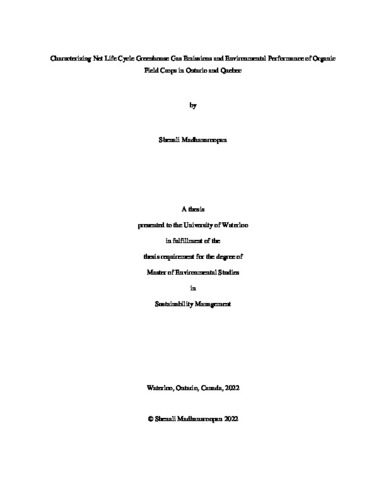| dc.description.abstract | Food production systems are at the heart of one of humankind’s greatest challenges – meeting the nutritional demands of a population expected to reach 10 billion by 2050 while limiting contributions to environmental degradation and greenhouse gas (GHG) emissions. Thus, producing field crops, which are staple crops for human consumption and animal feed, requires sustainable improvements. Organic farming is often promoted as a climate-friendly alternative to conventional production systems. As a fast-growing agricultural sub-sector in Canada, a robust assessment of the environmental impacts and GHG emissions from organic field crop production systems, considering regionally-specific production conditions and efficiencies, has not been conducted to date.
In this thesis, life cycle assessment (LCA) coupled with modelling soil organic carbon (SOC) changes are utilized to quantify the impact contributions from Eastern Canadian organic wheat, corn, and soybean production to a range of global-scale environmental concerns, including climate change. Specifically, this thesis aimed to characterize the environmental profile of organic field crop production in Eastern Canada, identify the underlying drivers of the impacts, and suggest best management practices for reducing GHG emissions and improving soil carbon stocks in this sector.
LCA results indicate that across all environmental impacts assessed, Eastern Canadian wheat had the largest impact per tonne of crop harvested, followed by corn and soybeans. Net greenhouse gas emissions were 520, 200, and 110 kg CO2-eq per tonne crop harvested for organic wheat, corn, and soybean production, respectively. Field-level N emissions from nutrient application were the biggest contributor to environmental impacts. Notably, while soil carbon sequestration was observed, it did not result in net negative production emissions. Furthermore, results from a literature review revealed a range of best management practices for enhancing SOC stocks in organic field cropping systems. Practices such as diverse crop rotations with green manure incorporation, less intensive field operations, manure application, and implementing combined practices are suggested to support SOC stocks of organic cropping systems; however, such practices can also contribute to field N emissions if not carefully managed. This work will help LCA researchers, farmers, and organic certification bodies better understand the climate performance of organic systems, while providing a methodological foundation for future organic LCA studies in Canada. | en |

